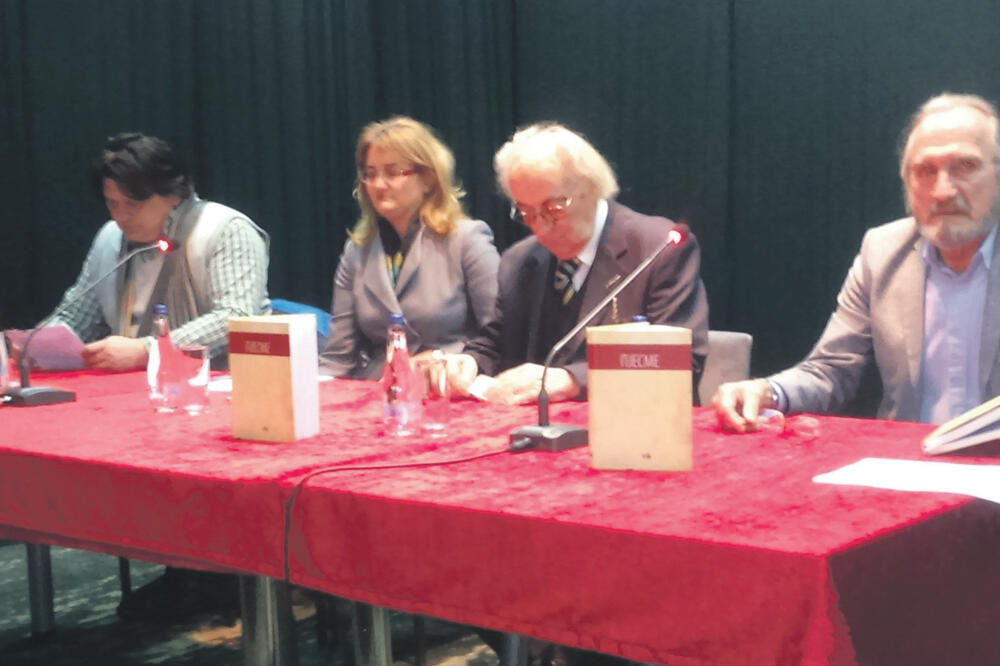Serbia, said Novak Kilibarda at the forum in Nikšić, which is dedicated to the poetry of Tešan Podrugović, has repaid the great national creator Filip Višnjić. A settlement, Višnjićevo, is named after him, there is almost no city that does not have a street named after him, even an award and a publishing company are named after him. Unlike Serbia, as Kilibarda said, Montenegro did not repay Starc Milija and Tesan Podrugović in the right way.
"If any creator who was born in the territory of the municipality of Nikšić deserved to have a monument built for him in Nikšić, or to have a street, then it is Podrugović", said Kilibarda and expressed the hope that Nikšić will be able to repay him in the right way. as he called him, an illiterate genius.
Tešan Podrugović, the moderator of the evening Miro Nikolić reminded, is one of the most important poets and singers with whom Vuk Stefanović Karadžić collaborated and with whom he recorded 25 songs. For Karadžić, Podrugović was the "ideal of a folk singer", and Kilibarda especially emphasized his "Homeric attitude towards the enemy". Because of the way he wrote about the Turkish girl, Vladan Nedic said that "she surpasses the Kosovar girl with the beauty of her morals".
"Such great creators help to strengthen Montenegro as a multi-ethnic state," Kilibarda said.
According to Ljiljana Pajović Dujović, Podrugović was a creator who managed to present oral literature in a special way. For him, Marko Kraljević was a privileged hero, and in addition to the songs written by Karadžić, Podrugović knew about a hundred more about bandits. The poems of that "luxurious, unusual poet-singer" have been compulsory school literature for decades.
"As for him, Vuk spoke songs as if from a book, he meant what he said, and he thought in pictures that remained anthological works. "He was able to stylize the song and make a good one out of a bad one," said Pajović Dujović.
He was, as she said, a man of freedom, a bandit, an outlaw, but also righteous.
Aleksandar Čogurić pointed out that Starac Milija, Tešan Podrugović and Avdo Međedović, those "epic maidans of Balkan oral literature", managed to reach "the greatest spiritual points of this civilization" with their songs.
"Oral literature is not part of a secured archive, but an active material that creators approach from different aspects," said Čogurić.
According to him, the big flaw of all anthologies of epic poems is that the name of the poet-singer by whom they were written is not mentioned under the poems. This deviation from the usual way of citing epic poems was done by Novak Kilibarda, who in the Anthology of Oral Poetry of Montenegro, "Viša je gora od gore", listed the name of the author by whom it was written under each poem, where there is information about it. The forum "The Significance of Tešan Podrugović's Poetry" was organized by the Faculty of Montenegrin Language and Literature, the "Poenta Poetika" Book Club and the National Library "Njegoš" as part of the February repertoire of the Nikšić cultural scene.
A magician of storytelling with the energy of folk humor culture
According to Ljiljana Pajović Dujović, in Podrugović's case we have the exclusivity that Vuk Stefanović Karadžić recorded not only his poems, but also two short stories. It is about the well-known folk tales, the humorous "Međed, the pig and the fox" and one of the most unusual and best of our folk tales "Međedović", which Pajović Dujović made a special reference to in her presentation. She reminded that "Međedović" was the first short story that was translated into German in 1819, four years after Podrugović told it, and was printed in these regions only in 1853.
"This short story is almost surrealistically conceived and represents a true literary masterpiece. The storyteller, whose every song was good, as Vuk used to say, proved to be a magician of storytelling," said Pajović Dujović.
According to her, Podrugović's storytelling carries the energy of the popular culture of laughter, and laughter is the basic intonation of his world view. He did not, as she said, tell funny stories or caricatures, but "saw funny" and is undoubtedly the most expressive humorist among Vuk's singers and storytellers.
Bonus video:




